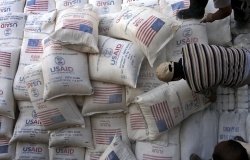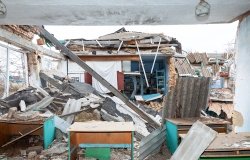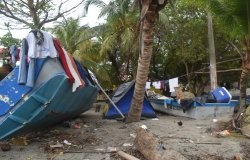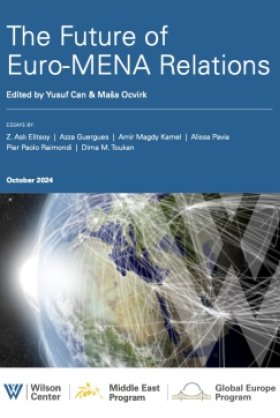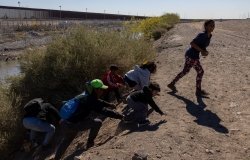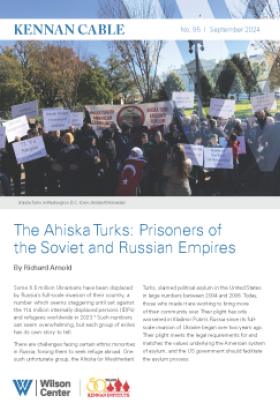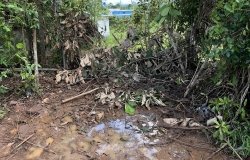EU Migration Deterrence in North Africa: Countries North and South of the Mediterranean Must Step up Collaborative Solutions
Despite efforts to control migration, myriad factors continue to drive migration from Africa to Europe. The EU must move away from ineffective, deterrence-based support to North Africa, towards collaborative, rights-based strategies to manage the Mediterranean passage.

Hasan Mrad / Shutterstock.com
The search continues for the 23 people who went missing off the Tunisian coast on May 18. This recent incident underscores that the European Union‘s (EU) externalization approach to control irregular migration has so far failed to deter individuals from crossing the Mediterranean to reach Europe. Tunisia and Libya have become significant departure points for irregular crossings to Europe. Tunisia has even surpassed Libya in the number of crossings, with the city of Sfax emerging as a hotspot.
Former Tunisian Minister for Women’s Affairs Lilia Labidi said President Moncef Marzouki's removal of the Visa requirement for certain African countries during his mandate from 2011 to 2014 explains the wave of migrants passing through Tunisia. Furthermore, the Sahel is experiencing a plethora of structural, economic, climate, and social crises, all of which are fueling migration to the north.
Partly because of its popularity, the Mediterranean passage is among the most perilous.
Partly because of its popularity, the Mediterranean passage is among the most perilous. According to the International Organization for Migration (IOM), 2, 498 migrants drowned while crossing the Mediterranean Sea in 2023, with January to March last year being the worst quarter since 2017.
Devaluing protection in the EU
We have seen the Mediterranean become a graveyard, yet the reaction remains timid. The often-subdued response to frequent tragedies highlights a critical need for a shift in perspective within European societies and policies. A constructive approach would involve a concerted effort to create and promote safe, legal pathways for migration. Such initiatives are feasible and essential for upholding the dignity and rights of individuals seeking refuge.
This situation becomes more pronounced when considering the image of the EU as a champion of human rights. However, the influx of migrants creates more motivation to act than the mounting number of people who died in the crossing, as seen at the Malta summit on immigration, where a rise of migrants in the Italian island of Lampedusa reignited tensions.
Consequently, there has been a noticeable trend towards stricter asylum regulations and criminalizing search and rescue operations. Migration governance in the Mediterranean is also defined by deliberate acts of neglect by national coastguards, such as the EU-funded Libyan coastguard and the Greek coastguard, many of which engage in the illegal rerouting of migrants to other national waters, resulting in more deaths.
The oppression experienced by migrants is intensified by the growing influence of right-wing populism in Europe. The far-right perpetuates harmful stereotypes that are deeply ingrained in the European consciousness, fostering fear and hostility. These stereotypes paint Muslims as inherently less assimilated, less secular, and conspicuously different. Even left-wing politics is challenged by the influx of Muslim migrants, such as the French left, who see themselves as the guardians of laïcite, women’s rights, and the fight against racism.
Discrimination in North Africa
The EU bears a significant responsibility for the ongoing migrant abuses in other countries, such as Libya. Since 2015, it has provided continuous funding intended to enhance the Libyan coastguard's capabilities and improve conditions for migrants there. However, these funds usually end up in the hands of Libyan militias and traffickers, dooming migrants to inhumane treatment when apprehended.
The European Commission also provides funds to Tunisia under a plan to strengthen its coastguard and combat trafficking. However, this strategy raises concerns about the humane treatment of migrants. Reports of mistreatment by the Tunisian coastguard, especially against Black African migrants, underscore the importance of implementing strict oversight and human rights training.
To that effect, hateful rhetoric in the North African country is increasingly directed at migrants. According to Labidi, MP Fatma Mseddi, “has been very vocal in denouncing African migrants,” accusing them of terrorizing residents. Racism toward Black African migrants is not new in North Africa; in Morocco, these migrants are used as scapegoats for many social ills, including delinquency, disease, and low levels of education.
Moreover, it’s not only Black African migrants who experience pressure to migrate north. Tunisian journalist Achref Chibani sheds light on migration dynamics in rural areas like Tataouine in southern Tunisia. Despite the region's wealth in hydrocarbon resources, a minimal amount of the extracted resources is reinvested locally. More educated and younger groups facing rising unemployment, trade restrictions, and soaring prices are likely to consider emigrating.
Labidi summarized rising frustration with Europe’s migration policies, saying Tunisia “is experiencing a major economic crisis and cannot meet the needs of its population. It participates in the surveillance of maritime borders to protect the countries of the Northern Mediterranean, whose responsibility is to monitor their borders. Tunisia cannot be a land of transit, nor of gendarmes of the North.”
In July 2023, European Commission President Ursula von der Leyen, together with Italian Prime Minister Georgia Meloni and Dutch Prime Minister Mark Rutte, visited Tunisia to sign a memorandum of understanding to reduce migration to Europe. The leaders pledged €105 million for "border management" and more than €1 billion in additional loans and financial aid to help support Tunisia’s economy. The agreement faced criticism for its lack of human rights conditions and failure to establish a mechanism for suspending cooperation in the event of abuse, resulting in backlash across Europe.
The creation of safe and legal routes for migrants is not only a humanitarian imperative but also a strategic security measure for the EU.
The way forward
The creation of safe and legal routes for migrants is not only a humanitarian imperative but also a strategic security measure for the EU, given the immense scale and risks associated with the billion-dollar smuggling network along its southern border. For these reasons, the EU needs to develop better mechanisms to help protect those escaping their home countries due to severe circumstances.
However, countless incidents, such as the one on May 18, suggest that the EU is not only abdicating its responsibility in search and rescue operations but hasn’t learned from the migration crisis of 2015, when a wave of migrants and refugees reached Europe, especially from war-torn Syria. In contrast to the Eurozone Crisis at the time, the migration crisis induced weak incentives for cooperation. Then, too, human rights watchdogs were the sole humanitarian voice consistently calling out human rights violations.
However, the supranational power of the EU is imperative in reforming the Mediterranean Passage. Rather than recreating the same policy of deterrence externally, the European Commission needs to outline steps to tackle the crisis while coordinating and building ties with border nations, such as Italy. Despite the overhaul of the Dublin Regulation, the burden of managing migrants will still predominantly fall on the countries where they first arrive. In short, the EU's response to the migration crisis must prioritize human lives over political expediency.
It is also crucial to encourage the Tunisian government to enact legislation that guarantees the rights and protections of migrants. Additionally, measures should be taken to prevent future agreements like the MOU from failing by making them more equitable to the countries involved.
It is also particularly vital to address the Tunisian government's shortcomings in managing migration. They have incorrectly implemented short-term repressive measures, such as the mass expulsion of migrants to rural or border regions. Tunisia has not enacted a law that ensures the right to seek asylum, despite the requirements set by the 2014 Constitution and international agreements it has signed, including the African Refugee Convention and the UN Refugee Convention.
The lack of this commitment stems from the fact that it is neither economically nor politically advantageous for the Tunisian government. Enacting legislation that encompasses the establishment of reception centers, the processing of asylum requests, and integration efforts would necessitate political will and alignment of the Tunisian legal corpus.
From 2020 to 2022, the IOM facilitated Moroccan women's participation in the Spain-Morocco circular migration program. In their article discussing irregular migration from Tunisia, Hamza Meddeb and Fakhreddine Louati proposed a similar but larger-scale solution: establishing agreements between Europe and Tunisia to facilitate legal and circular migration. This approach would enable migrants to move between regions, addressing labor shortages in both areas.
Regardless of the prevailing political attitudes towards migration in the EU, the flow of migrants through the Mediterranean will persist as long as political, economic, and climate crises continue in their countries of origin and insufficient efforts are made to address these root causes. It is crucial to focus on reinvesting locally and addressing the structural issues that drive migration. Finding humane and regulated solutions is essential to ensure the safety of migrants at European borders and the countries of the Maghreb.
The views expressed in this piece are those of the author and do not express the official position of the Wilson Center.
About the Author


Middle East Program
The Wilson Center’s Middle East Program serves as a crucial resource for the policymaking community and beyond, providing analyses and research that helps inform US foreign policymaking, stimulates public debate, and expands knowledge about issues in the wider Middle East and North Africa (MENA) region. Read more



